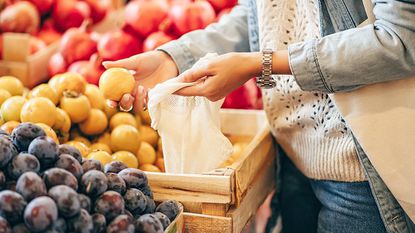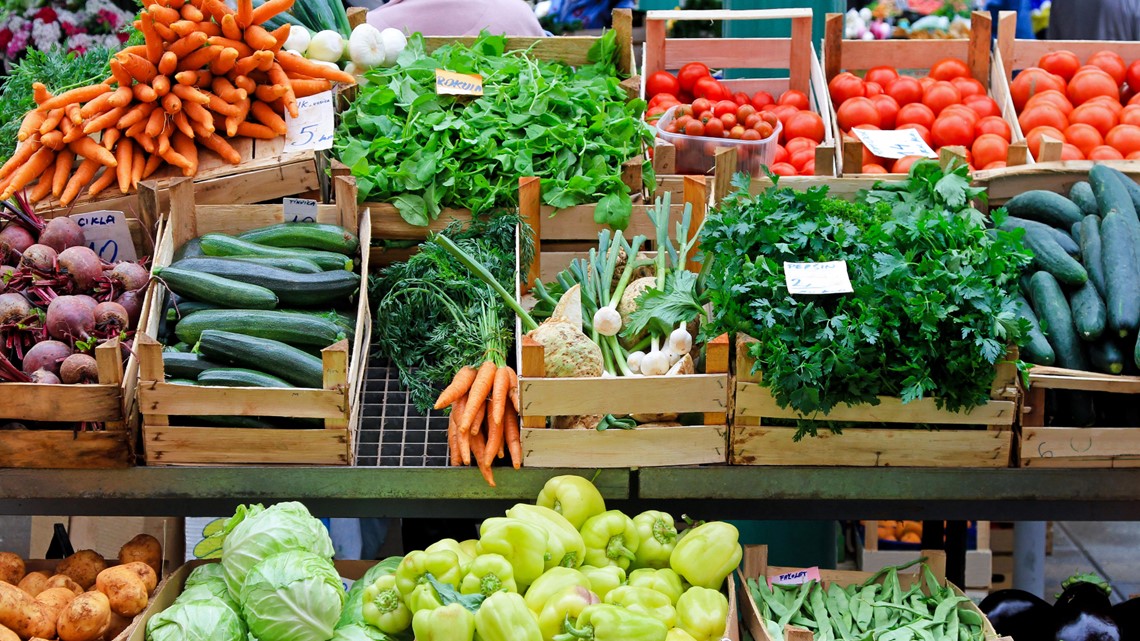
Dear Eartha, I try to avoid plastic when I go grocery shopping, but it seems practically impossible. What can I do?
The grocery store can be stressful enough remembering COVID-19 precautions, dodging your chatty neighbor, and managing coupon expiration dates, not to mention reducing plastic waste. Right here in Summit County, for every 100 pounds of trash, 7 pounds of it is plastic bags and wrap. Not sure if you’ve weighed plastic wrap lately, but 7 pounds is a whole lot.
With so many of our everyday food products wrapped or stored in some form of plastic, it’s easy to feel discouraged. But you can make a difference! Here are five easy ways to reduce plastic when you shop.
1. Before you go

Bring reusable grocery bags – it’s the lowest-hanging fruit in the effort to reduce our plastic use. According to Waste Management, only one percent of single-use bags are returned for recycling. The remainder end up in our landfill and waterways, where they never really break down. They just become another source of pollution.
Many of us have reusable bags, yet the challenge is remembering them! One way to help is by adding them to your grocery list. Writing things down helps our brains remember. If you’re not a list maker, make reusable bags handy in your bag or car or visible next to your door rather than stuffed into the closet. Make them part of your out-the-door routine so you’ll never be without for those spontaneous grocery stops.
2. Produce Picking
From the produce bags to pre-cut vegetables and berry containers, what’s a conscious shopper to do? Master your less-plastic practice with reusable produce bags. They’re typically made of washable mesh or cloth.
Skip the pre-cut veggies. We all could improve our knife skills, right? And if you can’t get your vegetables bare go for the biggest bag of those staples such as potatoes and carrots to reduce multiple bag waste.
Berry containers, called clamshells, are a tough one. I get it! How do you resist those delicious summer berries, cherry tomatoes, and tasty greens? If you can’t find an alternative, know that clamshells are not accepted for recycling in Summit County. Regardless of the number, these thin, flimsy plastics are not valuable like bottles and jugs. Clamshells can ruin all your hard recycling work, so please keep them out of the recycling bin. Confused on what a clamshell container is? Give HC3 a call at 970-668-5703.
3. In the Aisles
During the debate between different versions of the same product, consider the packaging. Avoid plastic when possible. Glass is the best option as it can infinitely be recycled. And for us, that process takes place just down the road through the Rocky Mountain Bottling Company. Also, look for packaging that’s made from recycled materials, often described as post-consumer content. Not only is this good practice, it builds demand for packaging made from recyclable materials.
4. During a Snack Attack
While convenient, single-portion snacks are big offenders. Most include an outer plastic wrapping with more plastic inside. What to do? Buy snack products in bulk and portion them out into reusable containers at home. Want to really flex your plastic free muscles? Make your own favorite snacks like crackers and granola, which can be a lot easier than you think.
5. Farmers Market

One of the biggest barriers to reducing plastic in food packaging is the time and distance it takes to get to the grocery shelves. That’s why now is the season to support local food and reduce your plastic waste. Dillon’s Farmers Market opens Friday, June 12 so it’s the perfect time to kick start your plastic free efforts and make the farmers market part of your shopping routine.
I know that plastic packaging can be unavoidable. Get creative and reuse your plastic bags when possible. Some grocers, such as City Market, accept a variety of clean plastic bags including the outer wrapping on product packages, film, and produce bags.
If you’re stressing over a failed attempt to reduce plastic packaging, I encourage you to minimize your impact in other ways. Reduce food waste, limit vehicle trips or take advantage of the free conservation programs offered by the High Country Conservation Center. Remember, individual actions make a collective impact.
